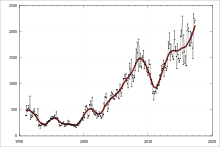Indian Australians
This article is missing information about Information reg. educational attainment, further history, etc.. (July 2014) |
| Total population | |
|---|---|
| 619,163[1] 2.3% of the Australian population (by ancestry, 2016)[2] | |
| Regions with significant populations | |
| Sydney | 134,387[3] |
| Melbourne | 126,787[3] |
| Brisbane | 78,259[3] |
| Languages | |
| Religion | |
| Related ethnic groups | |
Indian Australians are Australians of Indian descent or heritage. This includes both those who are Australian by birth, and those born in India or elsewhere in the Indian diaspora. They are one of the fastest growing communities in Australia today.[4]
In 2005-2006 India was the fourth major source of permanent migrants to Australia behind the United Kingdom, New Zealand and China. Between 2000–2001 and 2005–2006, the number of migrants who came to Australia from India increased from 4,700 to 12,300 people.[5] In 2011-12, Indians became the largest source of permanent migration to Australia forming 15.7% of the total migration programme. Australia's Indian-born population also recorded the fastest growth in the country in 2008-2009, increasing by 44,012 (17%).[4] The largest Indian Australian population is found in the state of Victoria.[3]
Indian Australians record high levels of educational attainment that surpass the national average. In 2016, it was revealed 54.6% of Indian migrants in Australia hold a Bachelor’s degree or a higher educational degree, three times more than Australia’s national average of 17.2% in 2011, making them the most educated migrant group in Australia.[6]
History

A study of Indigenous Australian DNA has found that Indigenous Australians may have mixed with people of Indian origin about 4,200 years ago. The same study showed that flint tools and Indian dogs may have been introduced from India at about this time.[7]
Indian immigration to Australia began early in colonial history. The first Indians arrived in Australia with the British settlers who had been living in India.[8] From the 1860s, Indians, most of them Sikh, worked as merchants, industrialists, and businessmen to operate throughout outback Australia, as 'pioneers of the inland'.[9] The 1881 census records 998 people who were born in India but this had grown to over 1700 by 1891.[8]
Migration from India was curtailed after the Australian Government introduced the Immigration Restriction Act 1901, but following India's independence from Britain in 1947, the number of Indian-born British citizens emigrating to Australia increased, along with migration of mixed race European-Indians, such as Anglo-Indians, Dutch Anglo-Indians and Portuguese Goans.[10][11]
Demographics

During the 2006 Census, 147,106 Australian residents declared that they were born in India, of which 79,025 held Australian citizenship. The states with the largest Indian-born residents were New South Wales (57,156), Victoria (52,853) and Western Australia (15,157). 64,968 declared they were Hindu and 26,500 declared they were Sikh. Other minorities include Muslims and Christians.[4] 243,722 Australian residents declared that had complete Indian ancestry, which is almost 100% of the entire Indian community in Australia.[12]
The Indian-born community more than doubled between 2004 and 2009 to 308,542, making it the second largest non-European group in Australia after Chinese-born Australians.[4] In 2009 there were an additional 90,000 Indian students studying at Australian tertiary institutions according to Prime Minister Rudd.[13]
Religion
According to the 2011 census, most Indian Australians are Hindus with about 276,000 individuals who profess Hinduism. There are many Indian Australian who also follow Sikhism, Christianity, Islam, Buddhism, Jainism, Zoroastrian and others.
See also
- Aboriginal Australians, referred to as Indians until the 19th century
- Australia-India Relations
- Fijian-Indian Australians
- Non-resident Indian and person of Indian origin
References
- ^ http://www.censusdata.abs.gov.au/census_services/getproduct/census/2016/communityprofile/036?opendocument
- ^ http://www.censusdata.abs.gov.au/census_services/getproduct/census/2016/communityprofile/036?opendocument
- ^ a b c d Australian Government - Department of Immigration and Border Protection. "Indian Australians". Retrieved 15 January 2014.
- ^ a b c d "Australia - Community Profile" (Microsoft Excel download). 2011 Census. Australian Bureau of Statistics. Retrieved 24 June 2012. Total responses: 25,451,383 for total count of persons: 19,855,288.
- ^ "Migration: permanent additions to Australia's population". 4102.0 - Australian Social Trends, 2007. Australian Bureau of Statistics. 7 August 2007. Retrieved 30 May 2008.
- ^ "Indians found to be Australia's most highly educated migrants - Interstaff Migration". 19 August 2016.
- ^ Creagh, Sunanda (15 January 2013). "Study links ancient Indian visitors to Australia's first dingoes". The Conversation. Retrieved 14 May 2014.
- ^ a b "Indian hawkers". museumvictoria.com.au. Archived from the original on 28 January 2015. Retrieved 22 March 2015.
{{cite web}}: Unknown parameter|dead-url=ignored (|url-status=suggested) (help) - ^ "Changing Face of early Australia". Australia.gov.au. 13 February 2009. Archived from the original on 2 April 2015. Retrieved 16 May 2015.
{{cite web}}: Unknown parameter|dead-url=ignored (|url-status=suggested) (help) - ^ [1] Archived 10 August 2007 at the Wayback Machine
- ^ "Australia immigration - More Immigration from India". workpermit.com. Retrieved 22 March 2015.
- ^ "Redirect to Census data page". abs.gov.au. Retrieved 22 March 2015.
- ^ [2][dead link]

